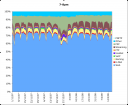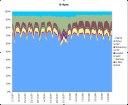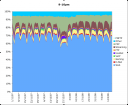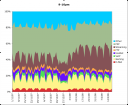Will BBC iPlayer usage break the Internet? - The bandwidth timebomb!
- Subscribe to RSS Feed
- Mark as New
- Mark as Read
- Bookmark
- Subscribe
- Printer Friendly Page
- Report to Moderator
- Plusnet Community
- :
- Plusnet Blogs
- :
- Will BBC iPlayer usage break the Internet? - The b...
Will BBC iPlayer usage break the Internet? - The bandwidth timebomb!
 Since we published the iPlayer Usage Effect blog we've been doing a bit more analysis of the usage and reading up on what other people are writing. As before we'll have a couple of headlines.
Since we published the iPlayer Usage Effect blog we've been doing a bit more analysis of the usage and reading up on what other people are writing. As before we'll have a couple of headlines.
- iPlayer usage is continuing to grow but at a slightly lower rate, up between 10% and 25% per hour comparing last week with the same week in January.
- iPlayer streaming outnumbers downloads by 8 to 1.
- iPlayer usage now accounts for approximately 5% of our network capacity.
We'll start off first with a link to Telco 2.0's BBC’s iPlayer nukes “all you can eat” ISP business model post. This contains a lot of data about how much extra usage is being used (or could be used) just through the BBC's iPlayer. One thing that does stand out though is:
"I would suggest that the easiest way for the BBC to escape the iPlayer conundrum is for them to pay an equitable fee to the ISPs for distributing their content and the ISP plan comes with unlimited BBC content, possibly with a small retail mark-up."
That sounds like a very interesting proposition. We can see exactly how much extra usage is being generated because of iPlayer and the BBC should be able to see how much data they are sending to each ISP so measuring the amount shouldn't be that much of a hurdle. For ISPs that use BT's IPStream products the costs are in the public domain so working out the costs aren't too hard, might be a little harder for LLU but should still be straight forward enough. We've already seen a tripling of bandwidth costs for streaming in less than two months, to offset that we've also seen an increase in revenue from extra usage being purchased but looking at the wider aspect there is the argument that the cost should be met by the BBC, but at what expense? Does the licence fee increase or do the BBC meet the cost from another source (e.g. cutting costs, more repeats, adverts in online content). The BBC have recently launched on iTunes, people in the UK can now download shows for £1.89, so far there aren't a huge number of shows available, but that is expected to grow and one thing that is expected is that shows will become available via iTunes once the 7 day period on iPlayer has ended. If successful this sort of thing could provide a potential revenue stream for paying for, at least part of, the ISPs' capacity. Another article on The register about the BBC considering dropping Flash for the streaming version of iPlayer, and also on Think Broadband, includes an old quote from the BBC's Director of new media and technology Ashley Highfield saying the impact of iPlayer on ISP networks has been "negligible", with traffic representing a "few per cent" of overall bandwidth. Mr Highfield has also posted an iPlayer Figures and Feedback blog on the BBC website. We thought we'd like to provide a little bit more information on what we are seeing. The following three graphs show the traffic on our network at three different hours of the day (7-8pm, 8-9pm and 9-10pm) since 1st November 2007. (Click any of the images for larger versions). 

 There are a few things that are immediately noticeable; first over Christmas it's a lot quieter, second Friday and Saturday nights are generally quieter but third and most important for this blog is that streaming traffic is on the way up. Back at the beginning of November streaming was using around 4-5% of the network during these hours but as at the middle of February it's around 9-10%. So an increase of about 5% and that's with an increase in capacity during that time as well. Our analysis of the streaming traffic is that in percentage terms most other applications are using roughly the same amount as before and that almost all of the growth is down to iPlayer. And so far we are seeing that most people are choosing to stream rather than download (The Guardian reports that streaming outnumbers downloads by 8:1). If the BBC plan to improve the quality of the streams then that's going to mean larger file sizes and an even higher percentage of traffic going into the streaming bundle. If we remove Web and PlusNet FTP from the graph for 9-10pm the growth looks like this.
There are a few things that are immediately noticeable; first over Christmas it's a lot quieter, second Friday and Saturday nights are generally quieter but third and most important for this blog is that streaming traffic is on the way up. Back at the beginning of November streaming was using around 4-5% of the network during these hours but as at the middle of February it's around 9-10%. So an increase of about 5% and that's with an increase in capacity during that time as well. Our analysis of the streaming traffic is that in percentage terms most other applications are using roughly the same amount as before and that almost all of the growth is down to iPlayer. And so far we are seeing that most people are choosing to stream rather than download (The Guardian reports that streaming outnumbers downloads by 8:1). If the BBC plan to improve the quality of the streams then that's going to mean larger file sizes and an even higher percentage of traffic going into the streaming bundle. If we remove Web and PlusNet FTP from the graph for 9-10pm the growth looks like this.  You can see where this is going, more people using iPlayer, more people using iPlayer more often and even more bandwidth being used by better quality streams. ISPs only have so much bandwidth available as do the peering and transit links between them. It only takes around 300 customers streaming at 512kbps to fill 155Mbps of capacity (which don't forget costs around £17,000 per month), if the improvements to the stream quality means the bandwidth doubles to 1Mbps then that's down to 150 customers. Even with 4Gbps of capacity available you're still only talking about 4000 customers at 1Mbps that can stream at the same time and that's without any other traffic. For now usage seems fairly spread out, we've looked at each hour of the day and each of our products and seen that by and large every product has seen an increase in streaming and across all hours of the day. There's no big spike of usage of everyone using it at the same time on Monday evening or Thursday afternoon for example. There's obviously more usage in the evenings as that's when people are using their connections but it's still fairly well spread. Put a live sporting event on a stream and I'm sure they'll be a very different story. We've seen in the past when an England football game for example is on Sky that some people will find a stream somewhere online to watch, or with a cricket test watch people will listen to commentary on Radio Five Live online while they are work. So put an England football game on or an FA Cup quarter final and we'd likely see thousands or maybe tens of thousands of people on our network and hundreds of thousands across all ISPs all wanting to watch the stream at the same time. This graph shows the amount of GBs of streaming downloaded per hour across the evening since 1st November.
You can see where this is going, more people using iPlayer, more people using iPlayer more often and even more bandwidth being used by better quality streams. ISPs only have so much bandwidth available as do the peering and transit links between them. It only takes around 300 customers streaming at 512kbps to fill 155Mbps of capacity (which don't forget costs around £17,000 per month), if the improvements to the stream quality means the bandwidth doubles to 1Mbps then that's down to 150 customers. Even with 4Gbps of capacity available you're still only talking about 4000 customers at 1Mbps that can stream at the same time and that's without any other traffic. For now usage seems fairly spread out, we've looked at each hour of the day and each of our products and seen that by and large every product has seen an increase in streaming and across all hours of the day. There's no big spike of usage of everyone using it at the same time on Monday evening or Thursday afternoon for example. There's obviously more usage in the evenings as that's when people are using their connections but it's still fairly well spread. Put a live sporting event on a stream and I'm sure they'll be a very different story. We've seen in the past when an England football game for example is on Sky that some people will find a stream somewhere online to watch, or with a cricket test watch people will listen to commentary on Radio Five Live online while they are work. So put an England football game on or an FA Cup quarter final and we'd likely see thousands or maybe tens of thousands of people on our network and hundreds of thousands across all ISPs all wanting to watch the stream at the same time. This graph shows the amount of GBs of streaming downloaded per hour across the evening since 1st November.  As you can see since the end of December when iPlayer launched there's a huge increase across every hour during the evening. For completeness here's the graph showing the rest of the day. In the early hours there's not a lot of change but certainly an upward shift but there bigger increases later on in the morning and the afternoon.
As you can see since the end of December when iPlayer launched there's a huge increase across every hour during the evening. For completeness here's the graph showing the rest of the day. In the early hours there's not a lot of change but certainly an upward shift but there bigger increases later on in the morning and the afternoon.  Couple that with iTunes (BBC content, movies, HD content) or Dailymotion HD clips or whatever the next big thing is after them and it all adds up to one heap of bandwidth. Look out for a further blog on this next month once we've had chance to review the full usage for February and see how it compares to January. Dave Tomlinson PlusNet Product Team
Couple that with iTunes (BBC content, movies, HD content) or Dailymotion HD clips or whatever the next big thing is after them and it all adds up to one heap of bandwidth. Look out for a further blog on this next month once we've had chance to review the full usage for February and see how it compares to January. Dave Tomlinson PlusNet Product Team
